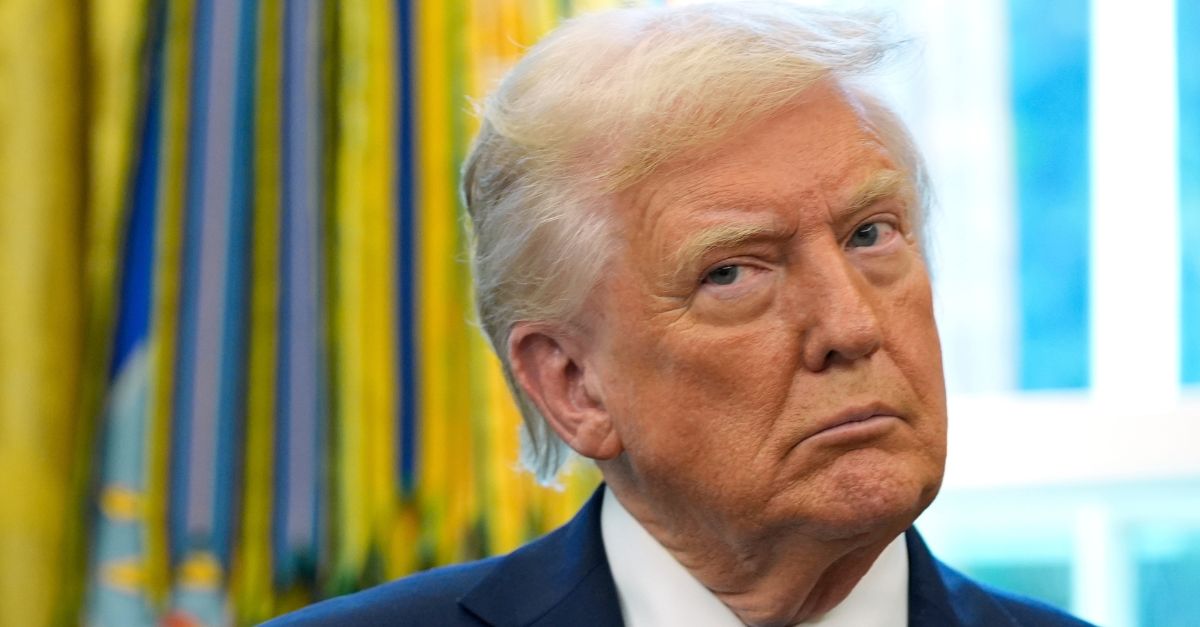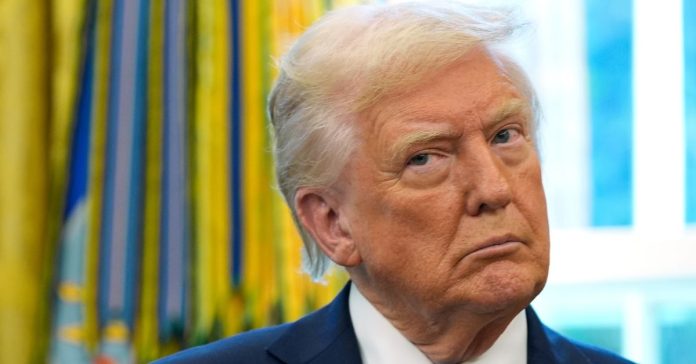
President Donald Trump listens during a ceremonial swearing in of Paul Atkins as chairman of the Securities and Exchange Commission, in the Oval Office of the White House, Tuesday, April 22, 2025, in Washington (AP Photo/Alex Brandon).
For the second time in two weeks, a federal judge has found one of President Donald Trump‘s executive orders targeting disfavored law firms unconstitutional.
On March 27, the 45th and 47th president signed an Executive Order entitled “Addressing Risks from WilmerHale” which — like many similar such orders — accused the Los Angeles-based law firm of Wilmer Cutler Pickering Hale and Dorr LLP, popularly stylized as WilmerHale, of “conduct detrimental to critical American interests” and which aimed to cut its employees out of the federal government.
The very next day, WilmerHale filed a 64-page complaint asking the court to enjoin Trump’s executive order as “unconstitutional.” The government, in turn, moved to dismiss the lawsuit entirely, turning the dispute into a battle over motions for summary judgment.
Now, Senior U.S. District Judge Richard J. Leon, a George W. Bush appointee, largely ruled for the plaintiffs, while dismissing three of the eleven counts as moot, in a 73-page memorandum opinion.
The court immediately gets to the heart of the matter by animatedly opining on the integral and time-honored role lawyers have played in American history and politics.
“The cornerstone of the American system of justice is an independent judiciary and an independent bar willing to tackle unpopular cases, however daunting,” Leon begins. “The Founding Fathers knew this! Accordingly, they took pains to enshrine in the Constitution certain rights that would serve as the foundation for that independence. Little wonder that in the nearly 250 years since the Constitution was adopted no Executive Order has been issued challenging these fundamental rights.”
The quick history lesson immediately ends in the present, with the judge castigating Trump‘s attacks on WilmerHale and other law firms.
“I have concluded that this Order must be struck down in its entirety as unconstitutional,” Leon writes. “Indeed, to rule otherwise would be unfaithful to the judgment and vision of the Founding Fathers!”
Notably, Leon uses a grand total of 27 exclamation points in his opinion — an apparent attempt to underscore what the judge views as the severity of the constitutional violations in Trump’s order.
In strikingly similar fashion to the order targeting the Chicago-based law firm of Jenner & Block LLP — enjoined in full last week — Trump’s order chides WilmerHale for employing onetime special counsel Robert Mueller and lawyers who worked with him during the investigation into Russian interference in the 2016 presidential election.
Noting that the order is “replete” with references to Mueller and his investigation, the judge finds these complaints clear evidence of an attempt to violate the First Amendment’s free speech guarantee.
“Trump disfavors WilmerHale’s representation of certain causes and the firm’s statements regarding Mueller,” the opinion goes on. “The Order suppresses that disfavored speech by imposing severe sanctions on WilmerHale both directly and indirectly. This viewpoint discrimination is ‘an egregious’ violation of the First Amendment!”
Trump’s Mueller fixation is of a piece with broader viewpoint discrimination in the context of attacks on law firms, Leon explains.
From the opinion, at length:
WilmerHale’s representation of clients in litigation is speech. The Order attacks the viewpoints WilmerHale expressed over the course of these representations, describing WilmerHale’s work as “partisan” and “political,” and maligning WilmerHale’s advocacy on behalf of causes disfavored by President Trump. The Order is also motivated by WilmerHale’s decision to “welcom[e]” Mueller to the firm and its statements that Mueller “embodies the highest value of our firm and profession.”
…
The First Amendment bars the Government “from relying on the ‘threat of invoking legal sanctions and other means of coercion … to achieve the suppression’ of disfavored speech.” Yet that is exactly what the Order here does: It both threatens and imposes sanctions and uses other means of coercion to suppress WilmerHale’s representation of disfavored causes and clients.
The court also found the order violated the First Amendment right to petition the government.
“Filing and pursuing lawsuits are forms of protected petitioning,” the judge observes.
In making its case, WilmerHale “has both alleged and shown” that Trump’s order punished the firm for past litigation on immigration and electoral issues. Additionally, the order has undermined the firm’s ability to “pursue litigation in the future” by revoking security clearances and by limiting “employees’ access to federal buildings and ability to engage with federal employees,” the opinion explains.
When pressed to account for limiting such access, the government only offered a “national security” justification, which the law firm conceded might have been sufficient. But, the judge notes, was merely conclusory.
Here, the court is withering.
“[T]he Order does not explain how WilmerHale’s conduct has threatened national security or how restricting its access to federal buildings or federal employees would remedy those threats,” the opinion goes on. “Instead, and as I have already found, the Order is plainly motivated by the President’s desire to retaliate against WilmerHale for its protected activity. This is not a legitimate Government interest, and the Order’s unsupported assertion of national security will not save it!”
The court also found that a section of the order purporting to mandate that all government contractors must disclose “any business” with the law firm violated WilmerHale’s right to free association.
In this area, the court professes puzzlement as to how such disclosures and revocations relate to what the government claims is an effort to prevent “racial discrimination,” finding no link between the contracting section and the offered justification.
“[T]he Order is an unconstitutional impairment on the firm’s and federal contractors’ freedom of association,” Leon writes.
While the court rejected three of the law firm’s claims — largely for procedural reasons — with prejudice, the upshot renders those rejections largely irrelevant because the entire order is enjoined.
“The Order is unconstitutional, and thus defendants do not have a legitimate interest in enforcing the Order,” Leon summarizes. “In fact, it is ‘obvious’ that the ‘enforcement of an unconstitutional law is always contrary to the public interest.’ Enjoining the Order serves the public interest by, for example, eliminating an obstacle to free speech and preserving the independent and adversarial nature of our judicial system.”

